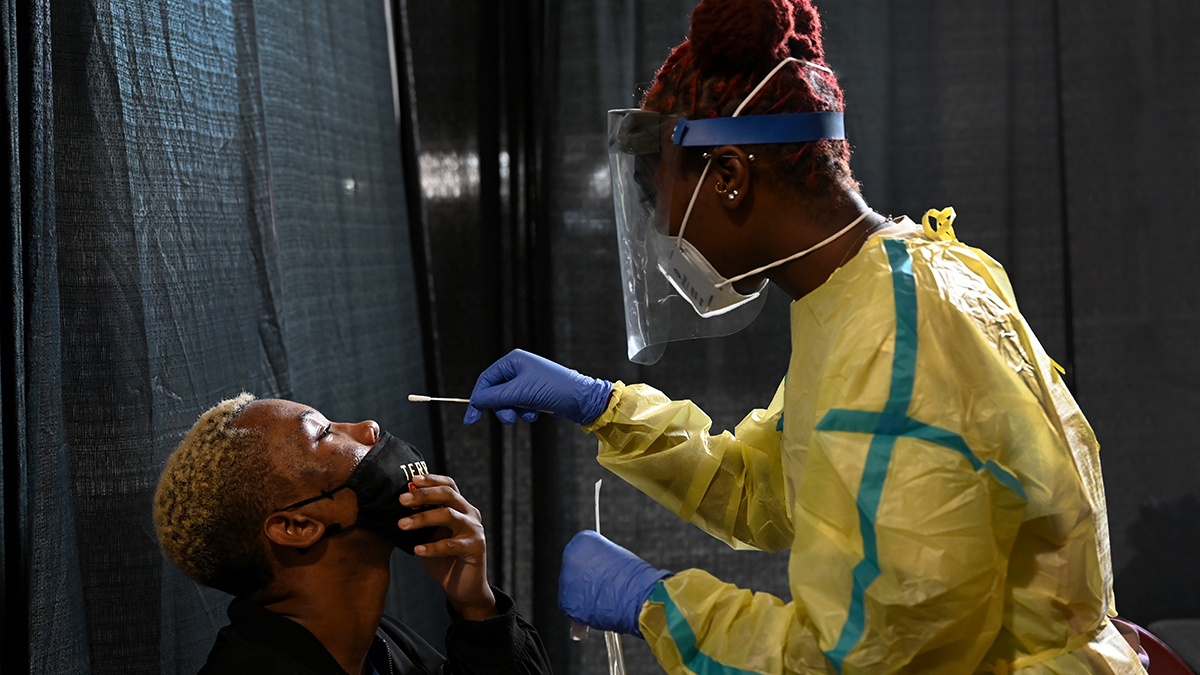A total of 6,507 new coronavirus cases were diagnosed in D.C., Maryland and Virginia combined on Saturday, breaking the region’s previous record.
Virginia also reported a new high in diagnoses, 2,922. D.C. also counted a record-breaking number of cases, 392. The state said a backlog of data contributed to the high number.
We're making it easier for you to find stories that matter with our new newsletter — The 4Front. Sign up here and get news that is important for you to your inbox.
Maryland reported 3,193 new cases Saturday, down from a record 3,792 reported on Friday.
The data suggests that slowdowns in infections earlier this week were short-lived and the surge in cases is now worsening.
On one hand, hope is coming in a vaccine. The very first shots are set to go out this month.
On the other, doctors warn the worst is yet to come and virus activity is exploding.
COVID-19 killed nearly 45 more people in the D.C. region, officials reported Saturday.
The coronavirus this week has been the nation’s leading cause of death, NBC News reported.
“Now’s the time to hang in there and not give up,” said Dr. Anthony Fauci, the nation’s top infectious disease specialist.
If federal regulators authorize two COVID-19 vaccine candidates, Virginia expects to receive enough doses by the year's end to begin inoculating nearly all of its health care workers and long-term care facility residents, officials said Friday.
The state voted this week to adopt federal recommendations that those two groups be prioritized for vaccination. The Virginia Department of Health estimates there are up to 500,000 health care workers and long-term care facility residents in the state and announced Friday that 480,000 doses of vaccine from Pfizer and Moderna could arrive by the end of December. Read more.
In the midst of the COVID-19 pandemic, health professionals say we can't forget about the other epidemic that was already spiraling out of control: the opioid crisis.
The City of Alexandria says overdoses are up significantly this year. Virginia as a whole has seen a 66% increase in overdoses this year.
"This is a public health crisis on top of a public health crisis," said Alexandria Opioid Response Coordinator Emily Bentley. Read more.
What the Data Shows
The data shows the coronavirus pandemic is worsening throughout the region.
D.C. reported 392 new cases on Saturday, a record-breaking high. Two more people died from the virus, officials said.
The daily case rate has risen to 31.38 per 100,000 people, whereas the goal in reopening phase two is a rate below 15.
In hospitals, 193 people are being treated for COVID-19. Hospital utilization is at 85.6%, in the yellow zone.
On average, it takes 3.7 days to get a coronavirus test back. The positivity rate is 5.3%, which is in line with the phase two goal.
Maryland reported 3,193 new cases Saturday. That number is lower than the previous day’s, but it’s the second-largest number of new cases diagnosed in a single day.
A total of 1,598 coronavirus patients are being treated in Maryland’s hospitals.
Prince George’s County remains the hardest-hit, with 43,635 infections and 924 confirmed deaths during the pandemic. It’s followed by Montgomery County with 35,538 cases and 935 deaths.
Virginia reported 2,922 coronavirus cases on Saturday, breaking the state’s previous record. Another 14 deaths were attributed to COVID-19.
The state said a backlog of data contributed to the high number.
The positivity rate has hit 10%, a level not seen since June 1.
Virginia’s hospitals report 1,508 coronavirus patients, its highest number ever.
Local Coronavirus Headlines
- If federal regulators authorize two COVID-19 vaccine candidates, Virginia expects to receive enough doses by the year's end to begin inoculating nearly all of its health care workers and long-term care facility residents, officials said Friday.
- Help is available for thousands of D.C. residents who have fallen behind on rent payments.
- D.C. Public Schools is preparing for an ambitious pilot program in which it will regularly test some students and staff for the coronavirus.
- The initial wave of vaccines likely won’t come close to covering all health care workers in D.C., Maryland and Virginia.
- Despite rising COVID-19 cases in the D.C. region, thousands of Northern Virginia students returned to the classroom Tuesday and began hybrid learning.
- Maryland Gov. Larry Hogan announced measures on Tuesday to boost the number of available health care workers and plan for more hospital beds.
- Thousands of Northern Virginia students returned to classrooms in Loudoun and Prine William counties Tuesday to begin hybrid learning.
- Some Fairfax County students have returned to all-virtual learning amid a rise in coronavirus cases.
- COVID-19 numbers continue to paint a dire picture for Black Americans, and there is an ongoing effort in the Black community to increase testing.
- Officials have reversed a decision to cancel the annual Wreaths Across America event at Arlington National Cemetery. The event, held in December, will happen after all.
- Maryland released a new contact tracing app, and has reduced indoor operations for bars and restaurants from 75% to 50% in response to rising coronavirus cases and increased hospitalizations.
Reopening Tracker
- Maryland tightened restrictions on businesses, bars and restaurants.
- All Smithsonian museums and the National Zoo closed because of rising COVID-19 cases, officials announced.
- Hours before some Fairfax County students were set to return to in-person learning, the school district said that they needed to delay the plan.
- Courts throughout Maryland partially shut down due to the pandemic.
- Virginia announced new measures to fight COVID-19 as cases of the virus have spiked across the country.
- Prince George's County tightened restrictions and required masks to be worn outdoors.
- Montgomery County reduced capacity limits at many businesses, including for indoor dining, to 25%. The county previously stopped giving waivers for alcohol sales after 10 p.m.
- D.C.'s mayor extended the city's coronavirus state of emergency to last through the end of the year.
How to Stay Safe
There are ways to lower your risk of catching coronavirus. Here are guidelines from the CDC:
- Wear a snug-fitting mask that covers your nose and mouth.
- Avoid being indoors with people who are not members of your household. The more people you are in contact with, the more likely you are to be exposed to COVID-19. If you are indoors with people you don’t live with, stay at least six feet apart and keep your mask on.
- Wash your hands often, especially after you have been in a public place.



